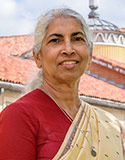 By Sister Teresa Kotturan, SCN
By Sister Teresa Kotturan, SCN
Sisters of Charity Federation NGO Representative to the United Nations
Climate change is a defining issue of our times. This fact was brought to the forefront a week ago, when more than 4 million people, mainly children and youth, took part in climate protects in 163 countries across the world. It was considered to be the largest climate protest in history. These protests were inspired by Swedish activist Greta Thunberg, who began her protests in front of the Swedish parliament a year ago. These protesters sent powerful messages to world leaders gathering at the United Nations for the Climate Action Summit. They urged them to wake up and take urgent climate actions based on scientific evidence provided in the Intergovernmental Panel on Climate Change Report and the Paris Climate Agreement.
At the Youth Climate Summit on Sept. 21, more than 1,000 youth activists, innovators, entrepreneurs and change makers committed to combating climate change gathered to chalk out a plan of action to transform the world. The youth want the leaders to listen to their demands to tackle global warming. They are asking us to change our unsustainable consumption and production patterns. They want a place at the table to have key roles in decision making. According to the UN Secretary-General’s Envoy on Youth, “climate change is the defining issue of our time… and the climate action must be fair and just to ensure that no one, especially young people, is left behind.”
Climate change is an existential problem for the 1.5 billion young people in the world between the ages of 15-24 years. It is their future we are trampling upon, for we are the last generation who can take pledges and make commitments to halt the ramifications of climate change. It is not a faraway problem – people are experiencing extreme heat, droughts, floods, air pollution, and rising sea-levels.
Pope Francis Video Message to the UN Climate Action Summit
During the UN Climate Action Summit, Pope Francis delivered a video message to the many heads of states and leaders. He said climate change “is one of the principal challenges we have to face. To do so, humanity is called to cultivate three great moral qualities: honesty, responsibility and courage.” He stated that commitments made by states are very “weak and far from achieving the objectives set.”
He further stated: “It is necessary to ask whether there is a real political will to allocate greater human, financial and technological resources to mitigate the negative effects of climate change and to help the poorest and most vulnerable populations, who suffer the most.”
The Pope went on to say: “The problem of climate change is related to issues of ethics, equity and social justice. The current situation of environmental degradation is connected with the human, ethical and social degradation that we experience every day … we are facing a ‘challenge of civilization’ in favor of the common good.”
Greta Thunberg at the UN Climate Action Summit Sept. 23
UN Secretary-General Antonio Guterres at the opening of the Climate Action Summit Sept. 23
Did the world leaders listen to the pleas of the young people and the rest of the world? Though the Secretary-General had asked the world leaders to come with concrete, realistic plans to implement the Paris Climate Agreement and not with speeches, real commitments from major polluting countries were disappointing. A group of 77 smaller countries said they were committed to achieve net zero carbon emissions by 2050 and 70 countries expressed their intention to set a more ambitious climate plan next year.
The signs of progress came from the private sector and subnational actors (cities). Investors led by Bill Gates committed $790 million for climate smart agriculture. The most ambitious commitment has come from Denmark. The country had committed to achieve net-zero emissions by 2050, but now plans to reduce emissions by 70 percent by 2030. To help towards this end, Danish pension funds have pledged to invest $51.7 billion in green assets by 2030. Another piece of good news is that Russia ratified the Paris Climate Agreement, which comes into action in 2020. At the closing of the Summit, Mr. Guterres said, “We have a long way to go.” We need to keep up the pressure on governments, while we change our lifestyles to walk the talk.
World leaders have to demonstrate that it is possible to take action now, to de-carbonize the economy and maintain a high standard of living in an inclusive economy that leaves no one behind. Focus should be on renewable energy, circular economy approaches to deal with waste streams, and nature-based solutions that protect and rehabilitate landscapes as well as to sequester carbon. There is need to increase the resilience of people everywhere to adapt to the changes in climate that are already with us.
